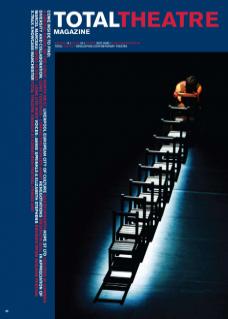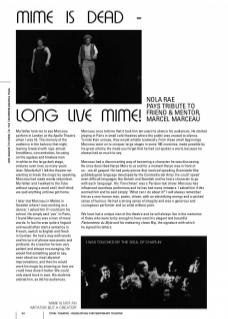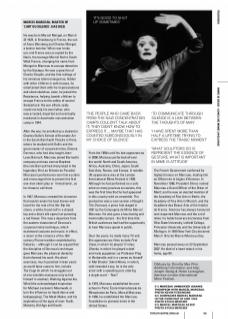My father took me to see Marceau perform in London at the Apollo Theatre when I was 16. The memory of the audience in the balcony that night, leaning forward with rapt, almost breathless, concentration, focusing on the ageless and timeless man in white on the large dark stage, endures even now, so many years later. Wonderful! I left the theatre not wanting to break the magic by speaking. Marceau had made words redundant. My father and I walked to the Tube without saying a word and I don’t think we said anything until we got home.
I later met Marceau in Malmo in Sweden where I was working as a dancer. I asked him if I could join his school. He simply said ‘yes’. In Paris, I found Marceau was a man of many words. In fact he was quite a linguist and would often start a sentence in French, switch to English and finish in German. He had a way with words and his turn of phrase was poetic and profound. As a teacher he was very patient and always encouraging. He would find something good to say, even about our most abysmal improvisations, and then he would work his magic by showing us how we could have done it better. We could only stand back in awe. His students adored him, as did his audiences.
Marceau once told me that it took him ten years to silence his audiences. He started playing in Paris in small cafe theatres where the public was unused to silence. To hide their unease, they would whistle tunelessly. From these small beginnings Marceau went on to conquer large stages in some 100 countries, made possible by his great artistry. He made you forget that he had not spoken a word, because he always had so much to say.
Marceau had a disconcerting way of becoming a character he was discussing. He once described Harpo Marx to us and for a moment Harpo was in front of us – we all gasped. He had party pieces that involved speaking Grammelot (the gobbledygook language developed by the Commedia del Arte). He could ‘speak’ even difficult languages like Danish and Swedish and he had a character to go with each ‘language’. His ‘Frenchman’ was a Parisian taxi driver. Marceau has influenced countless performers and he has had many imitators. I asked him if this worried him and he said simply: ‘What can I do about it?’ I will always remember him as a very human man, poetic, driven, with an electrifying energy and a wicked sense of humour. He had a strong sense of integrity and was a generous and courageous performer and an artist without peer.
We have lost a unique man of the theatre and he will always live in the memories of those who were lucky enough to have seen his elegant and beautiful Pantomimes du Style and his endearing clown Bip, the signature with which he signed his letters.
MARCEL MARCEAU, MASTER OF ‘L’ART DU SILENCE’, HAS DIED.
He was born Marcel Mangel, on March 22 1923, in Strasbourg in France, the son of Anne Werzberg and Charles Mangel, a kosher butcher. When war broke out, and France was occupied by the Nazis, the teenage Marcel fled to South West France, changing his name from Mangel to Marceau to escape detection by the Gestapo. He was a great fan of Charlie Chaplin, and the first inklings of his immense talent emerged as, hidden with other children in safe houses, he entertained them with his impersonations and silent sketches. Later, he joined the Resistance, helping Jewish children to escape France to the safety of neutral Switzerland. His war efforts sadly could not help his own father, who was arrested, deported and eventually murdered in Auschwitz concentration camp in 1944.
After the war, he enrolled as a student in Charles Dullin’s School of Dramatic Art in the Sarah Bernhardt Theatre in Paris, where he studied with Dullin and the great master of corporeal mime, étienne Decroux, who had also taught JeanLouis Barrault. Marceau joined Barrault’s company and was cast as Baptiste (the role Barrault had interpreted in the legendary film Les Enfants du Paradis). Marceau’s performance won him acclaim and encouraged him to present his first one-man silent play or ‘mimodrama’, as he chose to call them.
In 1947, Marceau created the character that would remain his best known and loved for the rest of his life: Bip the clown, a white-faced naïf in a striped top and a black silk opera hat sprouting a red flower. This was a departure from the austere classicism of Decroux’s corporeal mime technique, which eschewed costume and music: in effect, a return to the romance of the 19th century Pierrot tradition established by Deburau – although it can be argued that the discipline of Decroux’s technique gave Marceau the physical dexterity that informed his work. His silent exercises, much parodied in later years as world fame came to him, include The Cage (in which he struggles out of one invisible enclosure only to find himself in another), Walking Against the Wind (the acknowledged inspiration for Michael Jackson’s Moonwalk, in turn the influence on liquid dance and bodypopping), The Mask Maker, and his exploration of the ages of man: Youth, Maturity, Old Age and Death.
From the 1950s until his last appearances in 2006, Marceau performed all over the world: North and South America, Africa, Australia, China, Japan, South East Asia, Russia, and Europe. A notable UK appearance was at the London International Mime Festival in 1995. Although he had performed as a solo artist on many previous occasions, this was the first time that he had appeared in this country with an ensemble. The production was a new version of Gogol’s The Overcoat, a piece first staged in 1951 by the Compagnie de Mime Marcel Marceau. He also gave a fascinating and memorable lecture - the first time that British audiences had had the opportunity to hear Marceau speak in public.
Over the years, he made many TV and film appearances; films include First Class, in which he played 17 roles; Shanks, in which he played a deaf and mute puppeteer; as Professor Ping in Barbarella; and in a cameo as himself in Mel Brooks’ Silent Movie, in which, with intended irony, he is the only actor with a speaking part, uttering a single word – ‘Non!’
In 1978, Marceau established his own school in Paris: école Internationale de Mimodrame de Paris, Marcel Marceau. In 1996, he established the Marceau Foundation to promote mime in the United States.
The French Government conferred its highest honour on Marceau, making him an Officier de la Légion d’Honneur. In November 1998, President Chirac named Marceau a Grand Officer of the Order of Merit; and he was an elected member of the Academy of Fine Arts in Berlin, the Academy of Fine Arts in Munich, and the Académie des Beaux-Arts of the Institut de France. America has always honoured and respected Marceau and the art of mime: he holds honorary doctorates from Ohio State University, Linfield College, Princeton University and the University of Michigan. In 1999 New York City declared March 18 to be Marcel Marceau Day.
Marceau passed away on 22 September 2007. He died of a heart attack in his home, age 84.
Obituary by Dorothy Max Prior. Additional information and help: Joseph Seelig & Helen Lannaghan, directors London International Mime Festival.


